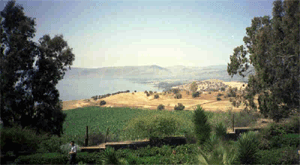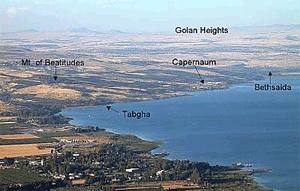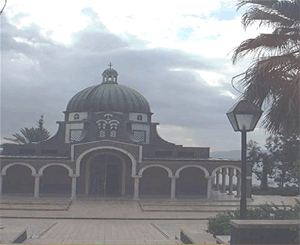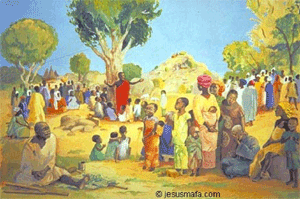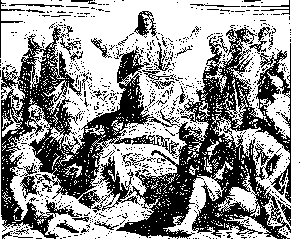
Christmas
Easter
Pentcoest
All Saints
Christ The King
Confirmation
Palm/Passion
Reformation
Stewardship
Books of the Bible
Lenten Series
Christmas Dramas
Videos
Series A - Matthew
Series B - Mark
Series C - Luke
Series D - Other
To contact
Edward F. Markquart
info@sfs.com
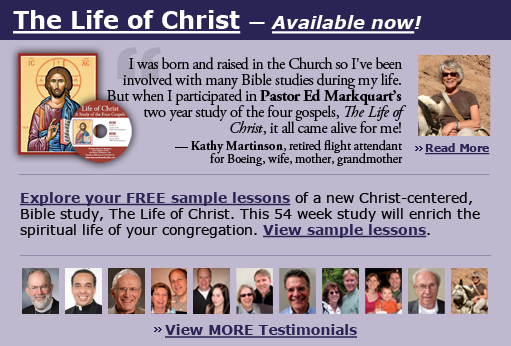
Series A Gospel Analysis: The Beatitudes ALL SAINTS, A, B, C Matthew 5:1-12 Pastor Edward F. Markquart The following Bible study is from a larger course entitled, THE LIFE OF CHRIST: A Study in the Four Gospels. This 54 week course for the laity will be available for congregations in 2006. Basic text for the course: SYNOPSIS OF THE FOUR GOSPELS, Kurt Aland, English Edition, P. 50-51. The following picture is a view of Lake Galilee from the location of where Jesus taught his disciples the Beatitudes and the “Sermon on the Mount.”
http://www.biblicalisraeltours.com/photos99/1.3.JPG The geography of Jesus: The picture below is a fantastic photograph and needs to be memorized in your mind in order to remember many of the most important geographic locations in Jesus’ life. This photograph will be repeated often in this course. Find and focus on the location of the Mountain of the Beatitudes. Find Tabgha. Tabgha was the location of the feeding of the 5000. From Tabgha to Capernaum was the scene of the disciples’ boat trip where Jesus walked “on” the water. Find Capernaum and Bethsaida and remember their location. Capernaum was Jesus’ home town in adulthood and Peter, Andrew, James and John were from Bethsaida. Peter had a home in Capernaum and we read about this home several times in the story of Jesus.
http://www.christiananswers.net/bibleplaces/home.html The following photograph is of the Church of Beatitudes overlooking Lake Galilee.
ttp://members.aol.com/jcs SOME GENERAL COMMENTS ABOUT THE SERMON ON THE MOUNT IN THE GOSPEL OF MATTHEW Jesus was known as The Teacher, The Rabbi. Jesus was and is the finest teacher of the kingdom of God. His students were called disciples or pupils of Jesus. One of the goals of this course is to carefully examine each and every teaching of Jesus, the Master Teacher of the Kingdom. There are about sixty teachings of Jesus in the four gospels. A teaching is a short, pithy saying of Jesus about life, love, morality, and God. These are not parables, nor miracles, not historical events, nor long speeches nor discourses. They are simple, pithy, insightful statements about the reign of God in our lives. Jesus’ teaching can also be found in parables, miracles, historical events and long discourses. Jesus can use any of these to teach us about the kingdom of God and life. Matthew arranges or systematizes Jesus’ teaching in five great blocks:
It does not seem that the Sermon on the Mount was one long series of teachings that Jesus gave on one occasion on a hillside overlooking Lake Galilee. Rather, these were moral teachings of Jesus that were spoken throughout his whole life and ministry. Matthew gathers many teachings of Jesus together in one place in Matthew 5-7; Luke’s similar collection is much shorter and in various chapters of his gospel. Many of Jesus’ teachings from Matthew’s Sermon on the Mount are found in Luke’s travel narrative, Luke 10-18. Since most of these teachings are not found in Mark but are common to Matthew and Luke, these teachings may have come from Q. Q is that theoretical document that is about 200 verses long, has many Aramaisms in it, and is assumed to be an ancient teaching document of Jesus. Some parts of Q seem to be written and the words are nearly identical in Matthew and Luke; other sections of Q are parallel only in theme but not exactly parallel in their precise wording. These parts of Q may be oral. Some scholars say that teachings of Q are the “Logia” that the early church fathers refer to and that Matthew recorded. In other words, Matthew may be the author of Q if Q is indeed the Logia referred to by Papias and the other early church fathers. Some scholars conclude that the teachings of Jesus and Q are the most ancient written record within the New Testament, written in about the year 40 CE. “Doing the will of God” is very important in Matthew’s gospel. It is mentioned eight times. 3:8; 7:15; 7:21, 24; 11:20; 12:50; 21:28-32; 21:43. “Let your righteousness exceed the Pharisees.” For Matthew, hypocrisy is the worst sin. The Gospel of Mark emphasizes believing and the Gospel of Matthew emphasizes doing. “Not everyone who says Lord Lord will enter the kingdom of God but those who do the will of my father.” Matthew 7:21. “A person who hears these words of mine and does them is like a man who build a house upon the rock, and the winds blew and floods came but did not destroy it.” Matthew 7:24 When Jesus’ family showed up on one occasion, Jesus said, “My mother, brothers and sisters are those who do the will of my Father.” Matthew 12:50. Doing the will of God is very important to Jesus and to the Gospel of Matthew. There are many interpretations and applications of the Sermon on the Mount e.g.
In the Sermon on the Mount, some Christians will take one particular moral teaching literally and the next moral teaching symbolically. One of the most common inconsistencies for Christians is to take one particular teaching of Jesus literally, but take the next moral teaching as Aramaic exaggeration in order to make a point. For example, some Christians will take Jesus’ teaching about “no divorce” literally but take his teaching about “an eye for an eye” as Aramaic exaggeration that makes a point. The Sermon on the Mount in the Gospel of Matthew consists of twenty-five units, whereas in the Gospel of Luke, it consists of only six units. In other words, the Sermon on the Mount is much longer in Matthew than its counterpart in Luke. #51 THE BEATITUDES Matthew 5:1-12, Luke 6:2-b-23 INTRODUCTORY THOUGHTS ABOUT THE BEATITUDES We immediately notice that there are nine beatitudes in Matthew and four in Luke. Luke’s list is much shorter. Jesus lays out for us what he feels are the most important blessings in life. Notice that none of Jesus’ blessings are material or physical like good health, good wealth, or long life. This teaching reminds us of the Old Testament story of King Solomon who did not ask God for long life or wealth but wisdom. In this story, we are hearing the wisdom of Jesus, although the word, “wisdom,” is not mentioned. “Blessed” or “joyful” is the key word. Highlight the word, “blessed,” in both accounts. Write the word, “joyful,” next to the word, “blessed.” Also write “divinely favored.” Also, write “not happy.” The word, “hap,” comes from Latin. From the Latin word, “hap,” we derive our English word, “happy.” The word, “hap,” means circumstantial; your mood is dependent on your circumstances. It is hap-hazard. On the other hand, the joy that we receive from God is an internal contentment with God and one’s self. There is a joy that comes from being humble, feeling the pain of another, hunger and thirsting for righteousness and living within right relationships. The word, “happy,” is not powerful enough and is not a good translation of the Greek underlying word. The mood of happiness is dependent on being immersed in happy circumstances and happy situations. The circumstances and situations that Jesus talks about are not happy circumstances yet people can feel an inner joy during difficult situations. As Matthew systemized the teachings of Jesus and was perhaps an eyewitness of those teachings, the first teaching that Matthew recalls for us is blessedness or joy. The followers of Jesus, then and now, know the importance of an inner joy that is not dependent upon haphazard circumstances or situations. Christians are forever discovering the differences between true joy/blessedness and temporary happiness. This true joy come from knowing you are divinely favored, that God has blessed your life in special and numerous ways. The beatitudes are often fundamental attitudes. Fundamental attitudes shape our destiny. I like the quotation by Charles Swindoll: “The longer I live, the more I realize the impact of attitude on life. Attitude, to me, is more important than facts. It is more important than the past, than education, than money, than circumstances, than failures, than successes, than what other people think or say I do. It is more important than appearance, giftedness or skill. It will make or break a company…a church…a home. The remarkable thing is that we have a choice every day regarding the attitude we will embrace for the day. We cannot change our past. We cannot change the fact that people will act in a certain way. We cannot change the inevitable. The only thing we can do is play on the one string we have, and that is our attitude. I am convinced that life is 10% what happens to me and 90% of how I react to it.” Notice the parallel beatitudes are in Mathew 5 and Luke 6. The teachings of Jesus in Mathew are clustered in Matthew 5-7. Notice the moral teachings of Jesus in Luke will come from various chapters and various locations in Luke. Notice Luke emphasizes “poor” and “being hungry.” Luke does not spiritualize the words, “poor and hunger,” as Matthew does. Luke talks about a joy that is found even when people are actually and literally poor and hungry. Having visited ghettos outside of Nairobi, Kenya, and having watched the poorest of the poor learn trade skills and earn their diploma from a “slum school,” I know that people can find honest joy living in the midst of enormous poverty and hunger. A visit to other places of poverty throughout the globe also reinforces this conviction: Christians can find joy even in their poverty and hunger. In fact, such Christians can actually radiate joy that is often incomprehensible to middle-class Americans who believe that poverty and hunger will automatically sink poor people into deep depression. -He went up the mountain and called to him those whom he wanted, and they came tohim.(Mark) This is “THE” mountain of the Sermon on the Mount. “Stood on a level place.” (Only Luke). Highlight. Write: “Sermon on the Plain.” This is called the “Sermon on the Plain” in the Gospel of Luke, whereas it is called the “Sermon on the Mount” in the Gospel of Matthew. Turn to page 65 in the SYNOPSIS and see that this sermon is called “The Sermon on the Plain.” - When Jesus saw the crowds, he went up the mountain; and after he sat down, his disciples came to him. Then he began to speak, and taught them, saying: (Matthew) Highlight in Matthew 5:1 and Mark 3:13a. Thus begins the Sermon on the Mount in Matthew. But in the Gospel of Mark, we do not have the Sermon on the Mount. The Gospel of Mark continues the Jesus story with the call of the first disciples and not the Sermon on the Mount. After 13a, write “Jesus appointed the twelve…and then Jesus went home.” Mark 13b says, “He went home.” So there is no Sermon on the Mount in the book of Mark. We hear only about the call of the twelve disciples. Some Biblical scholars emphasize that Matthew makes the distinction between the great crowds and his disciples. In the Gospel of Matthew, the Sermon on the Mount seems to be addressed to his disciples and not to the crowds. Also highlight the word, “taught,” because the Sermon on the Mount is the nucleus of the teachings of Jesus. According to Matthew, Jesus is the teacher, “par excellenance.” At the conclusion of the Sermon on the Mount in Matthew 7:28 and Luke 7:1 (Sermon on the Plain, page 64), we hear that the crowds have also been listening and were astonished at his teaching. So it should not be said too emphatically that these teachings were directed only towards his core of inner disciples. The crowds of people were listening to the teachings of Jesus on the mountain and crowds of people are still listening to the wisdom of The Teacher today. -"Blessed are the poor in spirit, for theirs is the kingdom of heaven. Poor in spirit = knowing your need of God.Poor people know their need of God; rich people often don’t. A visit to Haiti will quickly introduce you to many Christians who have a profound and deep awareness that they have a fundamental need for God in order to live effectively day by day; whereas in wealthier countries, we often minimize how much we need God’s presence and power for our daily lives -"Blessed are those who mourn, for they will be comforted. Mourn = empathetic. Every person needs to drink from the cup of sorrow. Karl Barth, a famous theologian said, “A generation with no great anguish in its heart will have no great music on its lips.” An Arab proverb says: “All sunshine and no rain make for a desert.” The greatness of the World War II generation in America is rooted in their anguish from the Great Depression and from their trauma of World War II. -"Blessed are the meek, for they will inherit the earth. Meek = humility and quiet inner strength. Humility, at first glance, does not have many “takers” in America, but then we quickly remember that most of us do not enjoy being around anyone who blows their own horn. -"Blessed are those who hunger and thirst for righteousness, for they will be filled. Hunger and thirst for righteousness = passionate about having right relationships.In the New Testament, the Greek word, “diakosynay” is translated righteousness. A story about Buddha tells about a time he was teaching a moral principle. He was holding a disciple’s head under water until that disciple almost drowned. Buddha brought his head up from the water and asked, “What do you want more than anything else?” The gasping disciple sputtered breathlessly one word, “Air.” Similarly, you and I are to deeply want right relationships with God and others more than anything else. We want God’s way of life, God’s love, God’s ways of justice and righteousness, more than anything else in the world. -"Blessed are the merciful, for they will receive mercy. Merciful = kind and compassionate. The opposite of mercy is judgment and a judging, a fault-finding heart. Consistently, God is forgiving and merciful to human beings, and we are asked to be the same to others. We are to be merciful as God was merciful in Christ and will be merciful to us on “the last day.” -"Blessed are the pure in heart, for they will see God. Pure in heart = sexual purity of heart and motivation. The Greek word, “purity,” has sexual connotations and overtones in the New Testament. In our American society with its hyped up sexual stimuli all around us, we are called to find a purity of heart and mind regarding sexual matters. -"Blessed are the peacemakers, for they will be called children of God. Peacemakers = people who are passionate about facilitating peace.A peacemaker normally gets drawn into places of conflict e.g. within families, churches, schools, work, cities, nations. In these conflictive and often hostile situations, a peacemaker works for God’s peace that is based on justice, fairness and righteousness. (Who said that discipleship was easy?) -"Blessed are those who are persecuted for righteousness' sake, for theirs is the kingdom of heaven. Persecuted for righteousness sake = people who are ridiculed for doing what is right in God’s eyes.Christians are to expect ridicule, persecution, for their lifestyle and beliefs. It is part and parcel of being a Christian. The first Christians experienced enormous physical persecutions initially from their Jewish families, Jewish friends and Jewish synagogue leaders and then from the Roman government and its representatives. Throughout the history of the church, there have always been persecutions, ridicule and martyrdom for following the ways of Christ. -On account of the Son of man. (Only in Luke.) Highlight. 6:22. Jesus is the Son of man. In Q, the self designation of Jesus is the Son of man, always in the third person, never specifically referring to himself as the Son of man, but the reader is aware that Jesus is the Son of man. In the New Testament, the Son of man is referred to 82 times. The origins of the “Son of man theology” is found primarily in the book of Ezekiel (93 times) and Daniel (2 times) and Enoch. -"Blessed are you when people revile you and persecute you and utter all kinds of evil against you falsely on my account. Rejoice and be glad, for your reward is great in heaven, for in the same way they persecuted the prophets who were before you. Jesus himself suffered under immense persecutions at the hands of the chief priests and the Pharisees and later the Roman government (Pilate). The first disciples experienced immense persecutions from both the Jews and Romans. The Apostle Paul experienced beatings and attacks from both the Jews and the Romans. If all these first disciples experienced persecution from following Christ, is not this the same inevitability for Christians today? That is, as Christians are open and honest about our commitment to Christ, we often experience ridicule, snickering and laughing behind our backs. Underline the phrase, “great is your reward in heaven.” Circle the word, “reward,” and write “13 times in Matthew” by it. The Gospel of Matthew likes the word, “reward.” Matthew uses the word, “reward,” thirteen times in his gospel. John does not use the word, “reward,” at all and Mark uses it only once and Luke twice. In other words, “reward,” is a favorite word and concept of Matthew, the tax collector. DISCUSSION QUESTION: WHAT DO YOU THINK ARE THE MOST IMPORTANT BLESSINGS OF LIFE?
http://www.jesusmafa.com/anglais/imag17.htm
THE BEATITUDES
|
